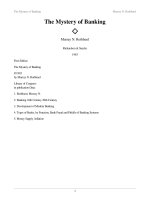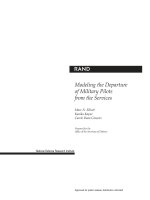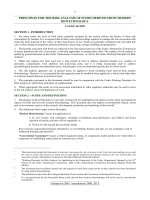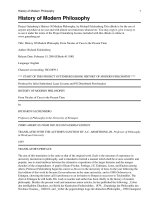The mystery of the ministry from particular wills to the general will (Pierre Bourdieu)
Bạn đang xem bản rút gọn của tài liệu. Xem và tải ngay bản đầy đủ của tài liệu tại đây (51.39 KB, 7 trang )
The Mystery of the Ministry: From Particular
Wills to the General Will
Pierre Bourdieu
A multitude of men are made one person when they are by one man, or one person,
represented; so that it be done with the consent of every one of that multitude in
particular. For it is the unity of the representer, not the unity of the represented, that
maketh the person one.
Thomas Hobbes, Leviathan
One will never assert and reassert often enough how much the illusion of naturalness, that “things have always been thus,” as we put it in The Craft of Sociology,1
and the amnesia of genesis in which they are they rooted, are an obstacle to
scientific knowledge of the social world. What could be more natural, more selfevident, for example, than the act of voting, which the dictionary defines, very
(socio)logically, in tautological manner, as “the act of expressing one’s opinion
by means of one’s vote, one’s suffrage”? And we shall no doubt never catch a
“political philosopher” posing, with the very natural solemnity with which
Heidegger asked “What is called thinking?,” the question “What is called voting?”
And yet all the resources of “essential thought” would not be superfluous, in this
case, to lift the veil of ignorance that forbids us from discovering the historical
contingency of what is instituted, ex instituto, and, by the same token, from
posing the question of the lateral possibles that have been eliminated by history
and the social conditions of possibility of the possible preserved.
To introduce the question of the relationship between the product, that is, the
vote, the “act by which” – as Le Robert dictionary puts it – “one expresses one’s
will, one’s opinion, in a choice, a deliberation or a designation, especially in the
juridical or political sphere,” and the social conditions in which it is not only
expressed but also produced, it suffices to quote a particularly enlightening page
from Durkheim’s Leçons de sociologie:
For votes to be an expression of something other than individuals, for them to be
animated by a collective spirit, the elementary voting college must not be formed of
individuals brought together only for this exceptional occasion, individuals who do
not know each other, who have not contributed to forming one another’s opinions
and who merely pass one after another before the ballot box. They must, on the
contrary, be a constituted, coherent, permanent group that does not just take shape
for a moment, the day of the vote. Then every individual opinion, because it has
Constellations Volume 11, No 1, 2004. © Blackwell Publishing Ltd., 9600 Garsington Road, Oxford OX4 2DQ, UK
and 350 Main Street, Malden, MA 02148, USA.
38
Constellations Volume 11, Number 1, 2004
been formed within a collectivity, has something collective about it. It is clear that
the corporation or guild answers this desideratum. Because the members who compose
it are in close and constant contact, their sentiments are formed in common and
express the community.2
Durkheim posits that one cannot separate the vote from its social conditions of
production and, more precisely, that the form and content of a political action are
inseparable from the mode of existence of the group within which it is produced.
And he thus counterposes, on the one hand, the occasional coming together of
individuals who pass in a booth in an isolated state, one by one, singuli, without
having cooperated beforehand to produce their opinions and, on the other hand,
a permanent and integrated group, a social body (corps, corporatis), capable of
working collectively to produce a genuinely collective opinion.
Whatever one thinks of the “corporatist” philosophy that he opposes to the
liberal philosophy of the vote as a free and individual choice, Durkheim has the
merit of showing that one must distinguish the mode of production or elaboration
of opinion (which he proposes to transform) from the mode of expression of that
opinion (which, in the example adduced, is preserved). And, above all, he has the
merit of inviting us to make explicit the philosophy of electoral practice ordinarily
taken for granted. The liberal vision identifies the elementary act of democracy as
it is ordinarily conceived with the solitary, nay silent and secret, action of individuals “brought together only for this exceptional occasion; individuals who do not
know each other, who have not contributed to forming one another’s opinions.”
This act, at once public and secret, is artificially instituted by the polling booth
whose protective curtain, hiding the choice made from the sight and therefore the
oversight of others, creates, together with the ballot box into which the bulletin
chosen is cast, the material conditions for the invisible, uncontrollable, and unverifiable expression (this is what distinguishes it from the vote by “show of hands”)
of an opinion said to be personal, which, for various reasons, one may wish to
keep secret. In addition, by bringing into existence, on a specific day, the succession
of individuals who “pass one after another before the ballot box” and by suspending,
“for a moment,” just long enough to make a choice, all social bonds, between
husband and wife, father and son, employer and employee, priest and parishioner,
teacher and pupil, and, by the same token, dependencies and commitments (how
to verify, even within a group based on mutual acquaintance or a corporate body,
whether such and such individual has kept his or her promise?), it reduces groups
to a detotalized series of individuals whose “opinion” will never be more than a
statistical aggregation of individual opinions individually expressed. One thinks
of the utopia dear to Milton Friedman, who, to grasp the point of view of families
about schools, proposes to hand out vouchers enabling them to purchase educational services provided by competing enterprises: “Parents could express their
views about schools directly by withdrawing their children from one school and
sending them to another, to a much greater extent than is now possible.”3 This
© 2004 Blackwell Publishing Ltd.
The Mystery of the Ministry: Pierre Bourdieu
39
amounts to treating political action as the purchase of a good or service, whether
a religious or political position-taking, a television channel or a store – in short, as
a form of economic action. And one cannot but evoke here also the model put
forth by Albert Hirschman by generalizing the experience of the consumer who,
confronted with a “lemon” (a deficient product), chooses between “exit,” leaving
the game, going to another store, and “voice,” staying to protest by expressing
criticisms and claims, an alternative which appears clear-cut only so long as one
remains within the logic of individual action.4
Within this logic, which is that of voting but also that of the market, “collective”
opinion is the product not of a genuine collective action, a work of collective
elaboration of opinion such as Durkheim evokes, but rather of the pure statistical
aggregation of individual opinions individually produced and expressed. The
cumulation of individual strategies and acts is collective, as it were, objectively.
Statistical aggregation operates only in mechanical manner and the inter-relating
of opinions takes place outside of the agents and independently of their consciousness and will. Individual opinions, reduced to the state of votes materialized by
voting slips and mechanically countable, like pebbles, tesserae, or tokens, are
added together passively, without anything being done to each of them. The
statistical mode of thinking is perfectly suited to this case, as it is whenever one
seeks to understand actions whose necessity is imposed “in and through the
anarchy of individual actions” (as Engels says about the market), actions such as
those which Max Weber calls uniform, or arising from similarity, the limiting
case being the behavior of people who open their umbrellas in a cloudburst.5
The logic of aggregation, which is at the heart of statistical – and also
economic – thought, presupposes conditions of validity, which in turn imply
limits. It imposes itself whenever groups are reduced to the state of aggregates,
sets of juxtaposed, accumulated, agglomerated elements which, like the individuals present at a given moment in the waiting hall of a railway station, coexist
partes extra partes, like grains in a heap of sand, without communicating or
cooperating as do the members of a group mobilized towards an action, political
or otherwise. (Statistical analysis of individual opinions, through surveys or opinion polls, apprehends the sets subjected to analysis as aggregates and contributes
to constituting them as such; the technique of random sampling, which rests on
the same presupposition, has the effect – unless special precautions are taken in
the treatment of the data thus constructed – of eliminating the functional weight
of the units that the random selection treats as interchangeable, thereby obliterating structures, those of fields for example.) Statistical or aggregative logic is fully
valid only when a set of individuals is reduced to the state of an aggregate
because it does not contain within itself the principle of its own assembly, its
unity, its aggregation, and because, having no power over itself, it is reduced to
powerlessness or to purely individual strategies of subversion or dissidence, such
as sabotage, pilfering, “goldbricking” or “featherbedding” in the world of industry, or isolated protest and complaint, or yet absenteeism and abstention, etc.
© 2004 Blackwell Publishing Ltd.
40
Constellations Volume 11, Number 1, 2004
In this case, problems or experiences that are nonetheless common to all may
remain in a state of confusedly shared malaise which is not constituted as political.
(To give an idea of the sense of powerlessness that accompanies entrapment in
serial, aggregative logic, it suffices to evoke the feelings experienced by the
discontented readers of newspapers – which help to explain the violence, well
known to journalists, of many readers’ letters – or disappointed radio listeners, or
yet again dissatisfied television viewers who are reduced to the isolated, passive
act of zapping, homologous to abstention from voting.)
It follows that the logic of the vote, which is ordinarily regarded as paradigmatically democratic, is doubly unfavorable to the dominated. First, agents do not
all possess to the same degree the instruments, especially the cultural capital,
necessary to produce what is called a personal opinion, in the twofold sense of
autonomous and conforming to the particularity of the interests attached to a
particular position (which means that the vote will truly become the universal
suffrage it claims to be only when the conditions of access to the universal have
been universalized). Second, the atomistic and aggregative mode of production
dear to the liberal vision favors the dominant, who, because the structures of the
social order operate in their favor, can be content with individual strategies (of
reproduction), whereas the only chance for the dominated to break out of the
dilemma of withdrawal (through abstention) and submission is for them to escape
the logic of individual choice, for them profoundly alienating.
But the lessons of historical experience, particularly that of the Soviet states,
and the teachings of social analysis do not incline those who would seek a mode
of formation of opinions that is the least inegalitarian possible – that is, capable of
giving everyone an equal chance of producing and imposing opinions corresponding to their interests – to rely unconditionally on the other mode of production and
expression of opinions, this one collective, which is based on delegation to institutions especially designed to produce and express collective claims, aspirations,
or protests (such as associations, unions, or parties), and charged, at least officially,
with the collective defense of the individual interests of their members.6 Thanks
to the social technology of delegation, which confers on the authorized agent the
proxy that gives him plena potentia agendi, the group re-presented finds itself
constituted as such: now capable of acting and speaking “as one man,” it escapes
from the powerlessness attached to serial atomization and it can mobilize all the
force, material and especially symbolic, that it contains in potentia. The impotent
protest or insignificant desertion of the isolated individual, variants of serial
action, that of the vote or of the market, which becomes effective only as an effect
of the blind and sometimes perverse mechanisms of statistical aggregation, give
way to a contestation at once unitary and collective, coherent and potent. The
members of a group hitherto united by a tacit agreement based on connivance, as
Weber puts it, a deep-seated complicity in suffering or in unexpressed, sometimes
shameful malaise (as in the case of stigmatized populations), accedes to public
existence and to political efficacy through words or symbolic behaviors whose
© 2004 Blackwell Publishing Ltd.
The Mystery of the Ministry: Pierre Bourdieu
41
exemplar is the demonstration. Words – words which make explicit by making
things visible and believable, or watchwords which make people act, and act in a
concerted way – are unifying principles of the situation and of the group, mobilizing
signs making it possible to constitute the situation and to constitute it as something common to the group, thereby contributing to constituting the group. This
is true at least according to the representations that the progressive tradition
has constantly opposed to the myth of the “invisible hand,” and which are so
many variants, themselves for a part mythical, of the Rousseauian figure of the
“Legislator” capable of embodying and expressing a “general will” irreducible to
the “will of all” obtained by the mere summation of individual wills.
In contrast to individual speech, shout or protest, the speech of the spokesperson
is an authorized speech which owes its authority to the fact that the person who
speaks it draws his authority from the group which authorizes him to speak in its
name. When the spokesperson speaks, it is a group that speaks through him, but
one that exists as a group through that speech and its speaker. The spokesperson
is a solution to the typically Durkheimian problem of the existence of the group
beyond the biological obstacles correlative with the temporal and spatial limits
inherent in the corporeality of individuals. One of the functions of the spokesperson and of the demonstration [manifestation] is to manifest the group that authorizes the spokesperson. And an authorized spokesperson can display the force
from which he derives his authority by calling on the group to mobilize and by
effectively mobilizing it, thus leading it to manifest itself (whence the importance
attached to the number of demonstrators). Authorized delegation is that which is
capable of mobilizing the group which authorizes it, and thereby of manifesting
the group as much for itself (by helping to maintain its morale and belief in itself)
as for others.
The most radical questioning of delegation comes from situations in which
the antinomy inherent in the logic of its social functioning is revealed. Indeed,
collective action founded on delegation is always haunted by the threat of usurpatory appropriation. Those responsible for the mobilization and manifestation of
the group who, through speech or any other form of representation – verbal or
enacted, theatrical – make tacit malaise and sufferings, unexpressed aspirations
and expectations, pass from implicit to explicit state, to expressed, “publicized”
opinion, Öffentlichkeit, enjoy an absolute power of creation since they make, in a
certain way, the group exist as such by giving it a body, their own, a name, a sigle
or “logo”7 as quasi-magical substitute for the group (in the manner of the sigillum
authenticum, the seal guaranteeing the validity of the solemn acts of royal power),
words that are watchwords capable of manifesting it. To produce this effect, they
must possess a power over the group which they derive from the group, a power
of mobilization working as power to manifest the group as a visible and effective
group, which they owe to the mobilized group upon which they wield that power.
Through this power, which in addition reproduces the principle of its own
efficacy, they assert and redouble the delegation of power of which they are the
© 2004 Blackwell Publishing Ltd.
42
Constellations Volume 11, Number 1, 2004
object. This misrecognized circular circulation of recognition is at the root of the
capital and symbolic power that the mandated agent, symbol exerting a symbolic
action of reinforcement of the symbol (like the flag and all the emblems of the
group), holds over the group of which he is the embodied substitute, the incarnation. This symbolic capital is thus inevitably concentrated in his person, which,
in and through its recognized existence (as delegate, representative, president,
minister, or secretary general), tears the group from the non-existence of a mere
aggregate, symbolized by the procession of voters isolated in the solitude of the
polling booth (aptly called in French isoloir).
If one adopts now the viewpoint of those who have no recourse but to delegate,
one can see that they can accede, through the person of an other, to powerful and
legitimate speech, known and recognized, authorized and authoritative utterance,
only by running the risk of being dispossessed of speech, deprived of an expression
that would be distinctively theirs, even of being denied, annuled in the singularity
of their experience and of their specific interests by the common speech, the
opinio communis such as is produced and proffered by their official delegate.
This happens in all cases where the ordinary members of corporate bodies, activists, subscribers, shareholders, and particularly of those mysterious collectives
(I always like to recall that the canonists used to link ministerium with mysterium)
that are especially set up to produce and express dissent and demands, such as
parties and trade unions, are themselves placed before the dilemma of desertion
or protest, exit or voice, because of a discordance between what they have to say
(which they may discover through this very discordance) and what is being said
by the authorized speech of the spokespersons. In these cases, they often can
escape from one or another form of serial powerlessness – that of “exit” or
individual protest, or even that of the petition aimed at getting the delegates and
spokespersons who, to crown it all, claim authority from them, to change their
discourse and policy – only by instituting a new organization, itself exposed, as
the holder of the monopoly of legitimate protest, to eliciting new protests and new
heretical desertions. Such is the antinomy faced by the reformed Church, which,
born of collective protest against the Church, sets up protest as the principle of a
new Church, thereby inspiring new protest against itself. The same destiny befalls
all the sects of the political world, “splinter groups,” wings, tendencies, and
factions which, being issued out of scission, are fated to endless scissiparity.
Is this antinomy insuperable? Is it possible to dominate the instruments that
had to be designed to escape from the dissident powerlessness of atomized,
detotalized existence and even from the anarchy of individual strategies? How
can the group master (or control) the opinion expressed by the spokesperson, the
person who speaks on behalf of the group and in its name, but also in its stead,
who makes the group exist by presenting and representing it but who, in a sense,
holds or takes the place of the group? The fundamental, quasi-metaphysical
question here is what it means to speak for people who would not speak if someone did not speak for them, who can have as efficient strategies only collective
© 2004 Blackwell Publishing Ltd.
The Mystery of the Ministry: Pierre Bourdieu
43
strategies, founded on a collective work of construction and expression of
opinion. The only real way out of the mechanical addition of preferences effected
by voting is to treat opinions not as things liable to being mechanically and passively added up, but as signs which can be changed by exchange, by discussion
and confrontation, the problem being no longer that of choice, as in the liberal
tradition, but of the choice of the collective mode of construction of choices
(when a group, whatever it may be, has to produce an opinion, it is important for
it to know that it first has to produce an opinion about the way to produce an opinion). To escape the mechanical aggregation of atomized opinions without falling
into the antinomy of collective protest – and thus to make a decisive contribution
to the construction of a genuine democracy – one needs to work towards creating
the social conditions for the establishment of a mode of fabrication of the “general
will” (or of the collective opinion) that is genuinely collective, that is, based on
the regulated exchanges of a dialectical confrontation presupposing agreement on
the instruments of communication necessary for establishing agreement or disagreement and capable of transforming the contents communicated as well as those
who communicate.
(Translated by Richard Nice and Loïc Wacquant)
NOTES
This essay appeared first as “Le mystère du ministère: des volontés particulières à la ‘volonté
générale’,” Actes de la recherche en sciences sociales 140 (December 2001): 7–11; it is published
here by kind permission from Jérome Bourdieu.
1. P. Bourdieu, J.-C. Chamboredon, and J.C. Passeron, The Craft of Sociology: Epistemological Preliminaries (New York & Berlin: de Gruyter, 1991 [1968]).
2. É. Durkheim, “Civic Morals,” in Professional Ethics and Civic Morals (London: Routledge
and Kegan Paul, 1957), 105 [tr. mod.].
3. M. Friedman, Capitalism and Freedom (Chicago: Chicago University Press, 1962), 91.
4. A.O. Hirschman, Exit, Voice and Loyalty: Responses to Decline in Firms, Organizations
and States (Cambridge, MA: Harvard University Press, 1970).
5. Max Weber, Essais sur la théorie de la science (Paris: Plon, 1965), 369.
6. On this point see “Delegation and Political Fetishism,” in P. Bourdieu, Language and
Symbolic Power (Cambridge: Polity, 1991), 203–19.
7. [Tr.: In French sigle is a name in initials, often an acronym, which may also form a
logogram.]
© 2004 Blackwell Publishing Ltd.






![Báo cáo khoa học: Assignment of the [4Fe-4S] clusters of Ech hydrogenase from Methanosarcina barkeri to individual subunits via the characterization of site-directed mutants pdf](https://media.store123doc.com/images/document/14/rc/do/medium_dor1394202044.jpg)


